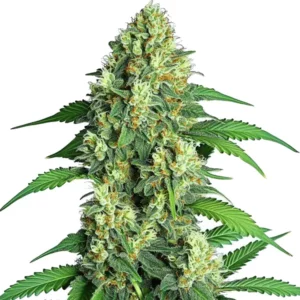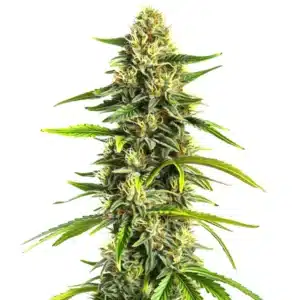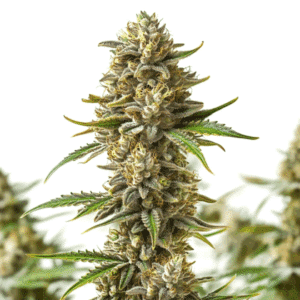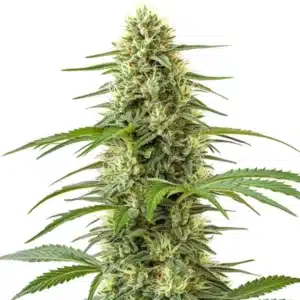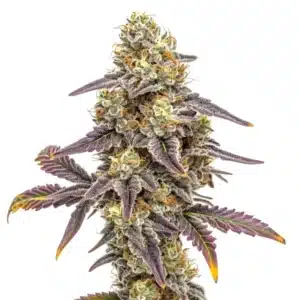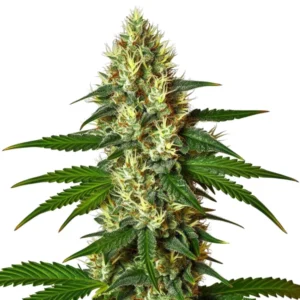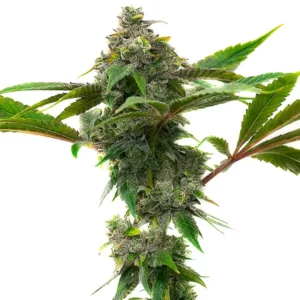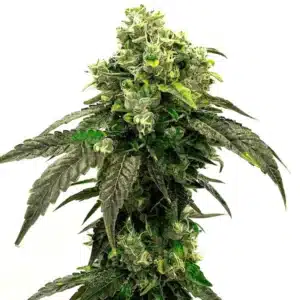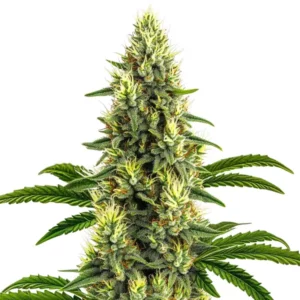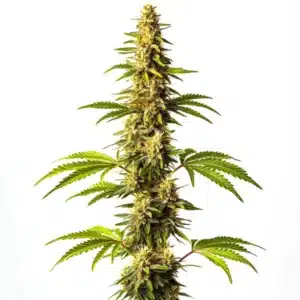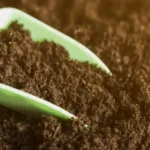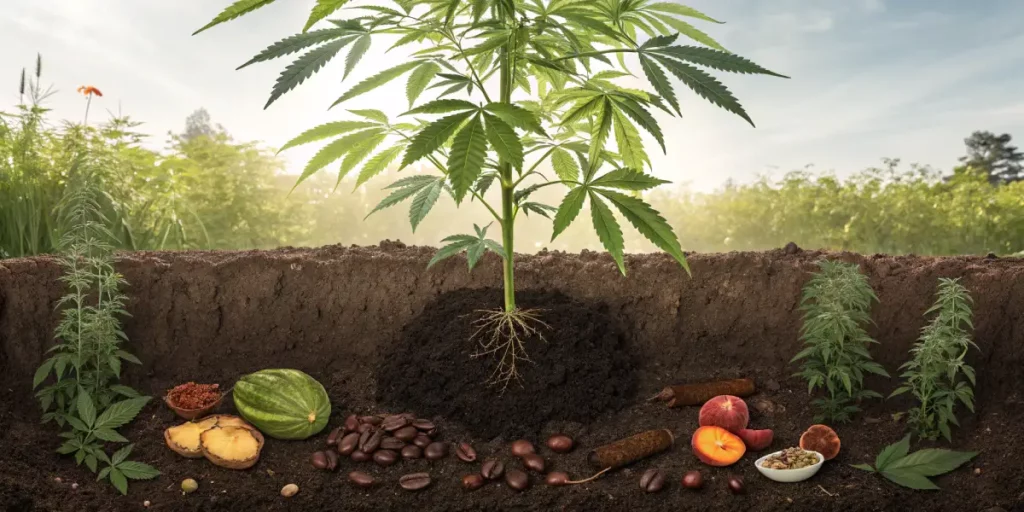
Best Compost for Cannabis: The Secret to Healthy Plants
When it comes to cultivating cannabis, the secret to achieving thriving, robust plants lies beneath the surface literally. The foundation of a successful cannabis grow is the soil, and choosing the best compost for cannabis is one of the most critical decisions you can make. Whether you’re a first-time hobbyist or a seasoned cultivator, understanding the importance of compost and how it impacts your plants can elevate your growing game to new heights.
Compost isn’t just dirt; it’s a powerhouse of nutrients and beneficial microbes that work in harmony with your cannabis plants. By feeding the soil with rich, organic matter, you’re creating the perfect environment for roots to grow deep, strong, and healthy. But what makes a particular compost better than another? Let’s explore the nuances and science behind this essential growing medium.
Recommended Strains
Jamaican
|
|
THC | 17% - 21% (Medium) |
|
|
Type | Feminized |
|
|
Yield | Medium |
|
|
Phenotype | 10% Indica / 90% Sativa |
Afghan Hawaiian x Laos x Jamaican
|
|
THC | 20% - 23% (Medium) |
|
|
Type | Feminized |
|
|
Yield | Medium |
|
|
Phenotype | 30% Indica / 70% Sativa |
What is Compost, and Why is it fundamental for Cannabis?
At its core, compost is organic material that has decomposed over time, transforming into a nutrient-rich substance often referred to as “black gold.” It’s made by combining “green” materials like fruit peels and fresh grass clippings with “brown” materials such as dried leaves, paper, and cardboard. The result is a material teeming with life microbes, fungi, and bacteria that work together to break down organic matter into nutrients that plants can absorb easily.
The Role of Compost in Cannabis Cultivation
Compost does more than just provide nutrients. It improves the soil structure, enhances water retention, and boosts aeration. This trifecta of benefits creates a thriving environment for roots, which is critical for cannabis plants. The microbes present in compost also play a vital role by breaking down complex organic compounds into simpler forms that plants can readily use. For cannabis growers, this means healthier plants, bigger yields, and even better flavor and potency in the final product.
Promos & Deals
Why Not All Compost is Created Equal
While all compost serves a similar purpose, the best compost for cannabis has specific qualities that set it apart. The cannabis plant has unique nutrient needs throughout its lifecycle, and understanding these needs can help you choose or create the ideal compost for your grow.
Key Characteristics of the Best Compost for Cannabis
- Nutrient Content: Cannabis plants require a balance of macronutrients (nitrogen, phosphorus, and potassium) and micronutrients like calcium and magnesium. The best compost delivers these nutrients in the right proportions, ensuring steady growth and robust health.
- Texture and Aeration: A good compost should be light, airy, and crumbly. This texture ensures proper drainage and allows roots to access oxygen easily, which is critical for healthy growth.
- pH Levels: Cannabis thrives in slightly acidic to neutral soil, with a pH range of 6.0 to 7.0. Compost that falls within this range helps maintain the right conditions for nutrient absorption.
- Microbial Activity: Healthy compost teems with beneficial microbes. These organisms not only help break down nutrients but also protect plants from harmful pathogens, creating a natural defense system for your cannabis.
Compost Ingredients to Avoid
Not all organic materials are suitable for compost, especially when growing cannabis. Certain items can introduce harmful elements into your soil or disrupt the delicate balance cannabis plants require.
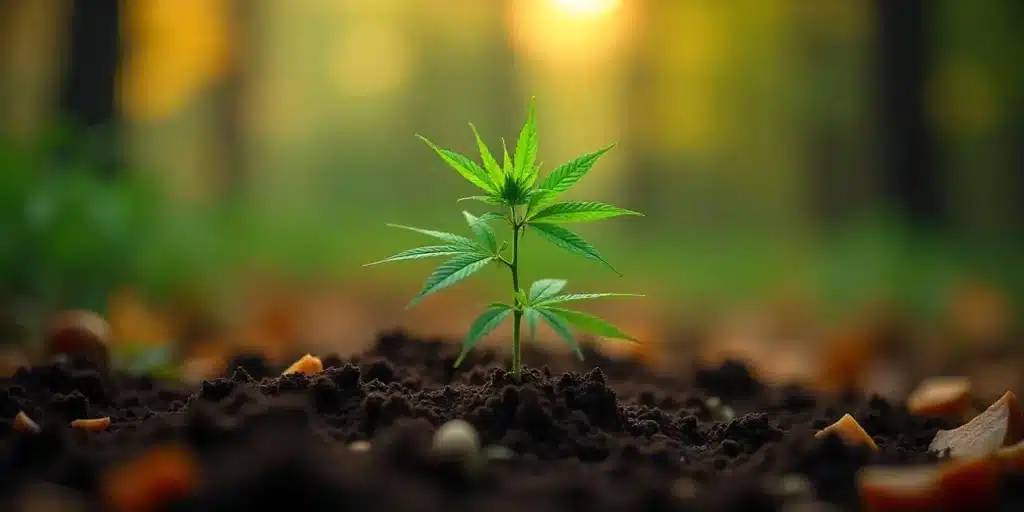
Items to Steer Clear Of:
- Meat and Dairy Products: These can attract pests and create foul odors during decomposition.
- Chemically Treated Materials: Avoid sawdust, wood chips, or paper products treated with chemicals that can leach into your compost.
- Weed Seeds or Diseased Plants: These can spread unwanted weeds or diseases to your cannabis crop.
- Oily Foods: Items like greasy leftovers or cooking oils can slow down the composting process and create imbalances.
By being selective about what you add, you ensure that your compost remains a high-quality, cannabis-friendly growing medium.
Crafting Your Own Cannabis-Friendly Compost
For those who want to take full control of their grow, making your own compost is an excellent option. Creating homemade compost allows you to tailor the nutrient content and quality to suit the specific needs of cannabis plants. Plus, it’s a sustainable way to recycle kitchen scraps and garden waste.
How to Make the Best Compost for Cannabis
Step 1: Gather Your Ingredients To start, you’ll need a mix of greens and browns:
- Greens (Nitrogen-Rich): Fruit and vegetable scraps, coffee grounds, fresh grass clippings, and eggshells.
- Browns (Carbon-Rich): Dry leaves, shredded paper, cardboard, and small twigs.
Step 2: Layer and Mix Alternate layers of greens and browns in a compost bin or pile. Aim for a ratio of roughly 2:1 (browns to greens) to maintain the right balance. Keep the pile moist but not soggy, and turn it every one to two weeks to aerate and speed up decomposition.
Step 3: Monitor and Wait Compost typically takes two to six months to fully mature, depending on the conditions. It’s ready to use when it’s dark, crumbly, and smells earthy.
Ready-Made Options: Choosing the Best Compost for Cannabis
If DIY isn’t your style, don’t worry. There are plenty of high-quality commercial composts available that cater specifically to cannabis growers. Here are a few standout options:
- FoxFarm Happy Frog Soil Conditioner: This blend is packed with beneficial microbes and fungi that stimulate root growth and enhance nutrient uptake. It’s a favorite among cannabis growers for its consistent results.
- Black Gold Organic Compost: OMRI-certified and 100% organic, this compost is rich in humus and provides a balanced nutrient profile ideal for cannabis plants.
- Coast of Maine Lobster Compost: This unique mix of composted lobster shells, cow manure, and peat is a nutrient powerhouse that supports robust growth and improves soil structure.
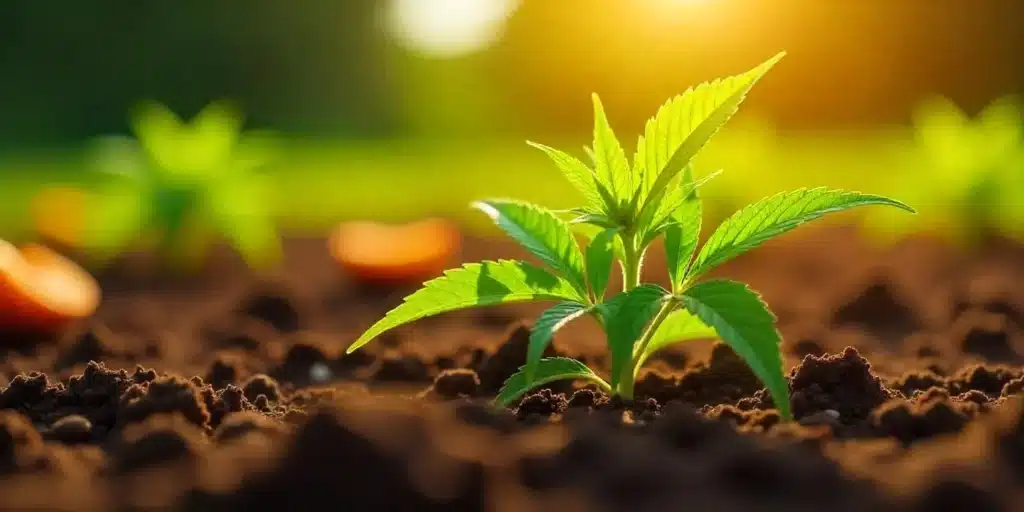
Using Compost in Cannabis Cultivation
Once you have your compost, the next step is incorporating it into your grow. There are several ways to use compost effectively:
Mixing with Soil: Blend compost with your soil at a ratio of 1:3. This ensures even nutrient distribution and creates a fertile growing medium.
Top-Dressing: Spread a layer of compost around the base of your plants. As you water, nutrients will seep into the soil, feeding the roots over time.
Compost Tea: Brew a nutrient-rich tea by steeping compost in water for 24-48 hours. Use this liquid gold as a foliar spray or a soil drench to give your plants an extra boost.
How Compost Benefits Different Stages of Cannabis Growth
Compost plays a vital role in every phase of the cannabis lifecycle, from seedlings to flowering. Here’s how:
Seedling Stage
During the seedling stage, cannabis plants are delicate and require a nurturing environment with minimal stress. Compost provides a gentle, slow-release source of nutrients that won’t overwhelm young roots. The improved soil structure from compost ensures adequate moisture retention, which is critical for seedlings that are sensitive to drying out. Additionally, the microbial activity in compost creates a protective barrier against soil-borne pathogens, helping seedlings establish strong roots early on.
Vegetative Stage
As cannabis plants transition to the vegetative stage, they enter a period of rapid growth, focusing on building stems, leaves, and overall structure. During this phase, the plant’s demand for nitrogen a key nutrient for foliage development increases significantly. Compost rich in nitrogen from green materials like kitchen scraps and fresh grass clippings delivers this nutrient steadily, ensuring lush and vibrant growth. Furthermore, the aeration and texture improvements provided by compost promote root expansion, allowing the plant to absorb nutrients and water more efficiently.
Flowering Stage
The flowering stage is when cannabis plants focus their energy on producing buds, which requires a shift in nutrient priorities. Phosphorus and potassium become more important during this phase, as they play a important role in flower formation, resin production, and overall plant health. A well-balanced compost ensures these nutrients are available in the right amounts, leading to dense, aromatic, and resin-rich buds. Compost also helps maintain stable moisture levels in the soil, preventing stress that could reduce flower quality or yield.
Transition Between Stages
Another advantage of using compost is its ability to adapt to the plant’s needs during transitions between growth stages. Unlike synthetic fertilizers that deliver nutrients in fixed amounts, compost releases nutrients gradually, allowing cannabis plants to naturally adjust to their changing requirements. This makes compost an ideal choice for growers looking to optimize plant health at every stage.
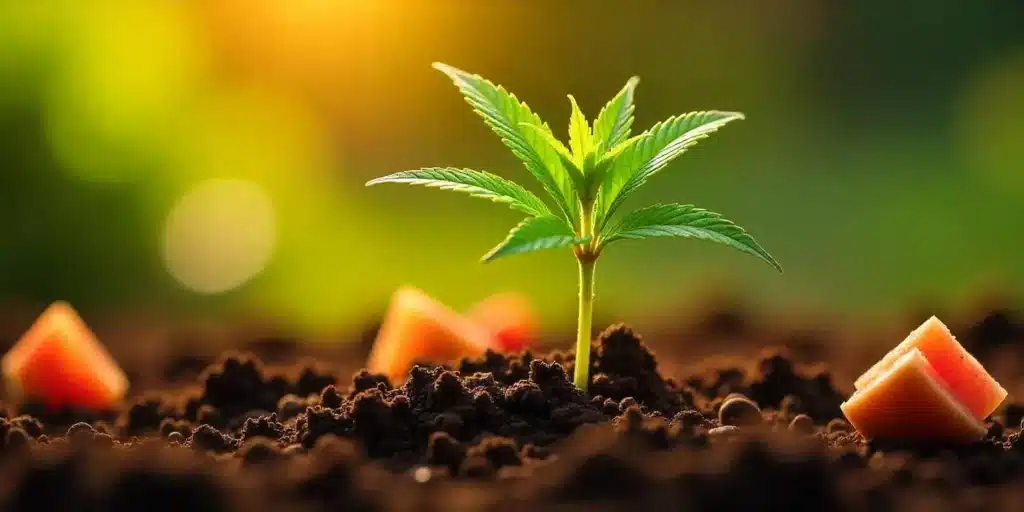
Troubleshooting Compost Problems
Even with the best intentions, composting can sometimes go awry. Here are common issues and how to fix them:
Problem: Bad Odors
Cause: Excess moisture or too many green materials.
When your compost pile smells foul, it’s often a sign of anaerobic activity a lack of oxygen caused by too much moisture or an overabundance of nitrogen-rich greens. This creates an environment where harmful bacteria thrive, leading to unpleasant smells like ammonia or rotten eggs.
Solution: Add more browns (like dry leaves, shredded cardboard, or straw) to absorb excess moisture and balance the nitrogen-carbon ratio. Turning the pile more frequently will also help introduce oxygen, which supports aerobic decomposition and eliminates bad odors.
Problem: Compost is Too Wet
Cause: Overwatering or poor drainage.
A soggy compost pile can slow down the decomposition process and create an environment for pests and mold. Wet compost is often the result of excessive watering or a lack of drainage in the compost bin or pile.
Solution: Mix in absorbent materials like shredded paper, sawdust, or dried leaves to soak up the excess water. Ensure your compost bin has proper drainage holes, and if the pile is outdoors, consider covering it during heavy rains to prevent waterlogging.
Problem: Slow Decomposition
Cause: Improper balance of greens and browns.
If your compost pile seems stagnant and isn’t breaking down as expected, it’s likely due to an imbalance in the materials. Too many browns can slow microbial activity, while an insufficient amount of greens reduces the nitrogen needed for decomposition.
Solution: Check your green-to-brown ratio and aim for roughly 2:1 (two parts browns to one part greens). Turn the pile to aerate it and add a nitrogen-rich booster, like fresh grass clippings or coffee grounds, to reignite microbial activity. Also, ensure the pile stays moist it should feel like a wrung-out sponge.
Compost vs. Synthetic Fertilizers: The Sustainable Choice
While synthetic fertilizers can deliver quick results, they often come at a cost to soil health and the environment. Compost, on the other hand, offers long-term benefits that extend beyond a single grow cycle. It’s sustainable, eco-friendly, and improves soil fertility over time. For cannabis growers, this means healthier plants and better yields in the long run.
FAQs About Compost and Cannabis
Can I Use Any Compost for Cannabis?
While general-purpose compost can work, it’s worth investing in a high-quality compost tailored for cannabis. These blends are designed to meet the specific nutrient needs of the plant, ensuring optimal growth.
How Often Should I Add Compost?
Top-dress your plants with compost every three to four weeks during the growing season. Alternatively, mix it into the soil at the start of your grow.
Is Compost Suitable for All Growing Methods?
Yes! Whether you’re growing in pots, raised beds, or directly in the ground, compost is a versatile and beneficial addition to any growing method.


